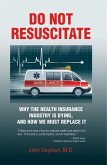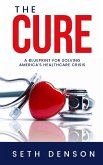Dysfunction in American healthcare is at a critical point. We pay too much. Not everyone has insurance coverage. We get mediocre results. Due to political rhetoric, problems fester. This book is a guide as to how we all can have affordable, quality care. How we can remake the system, so it works for patient. Here are the answers for a system that is killing and bankrupting us instead helping and healing us. Dr. Frangipane witnessed how the healthcare services are inefficient and rushed. Through conversations with policy experts, colleagues and patients, he saw what is wrong. This book is what he learned from both these experiences and research. Topics, like medical insurance coding, can be real snoozers. But Dr. Frangipane engages the reader. This book feels like a talk with your friend. He anticipates the reader's objections by answering each one of them. This book makes the abstract world of healthcare policy relatable. He tells stories that entertain the reader as they illustrate the problems of the American healthcare. Finally, the book is filled with Dr. Frangipane's unique humor. Dr. Frangipane starts by asking the simplest of questions. The first is if we truly have a crisis with our country's medical care system. He answers with a resounding yes and supported his answer. He backs it up with everyday examples. Next, he looks at the possible solutions for how a country can pay for healthcare. He concludes that a universal, governmental health insurance is the least costly and most efficient. Finally, he answers the objections one might raise about such a system.Dr. Frangipane names his system, "SPUN," for Single Payer Universal National Healthcare Plan. To fund it, he believes using our present federal tax system is the simplest and fairest. He shows that SPUN will save our country money. He analyses the finances of different individuals and businesses and shows they all come out ahead with his plan.He then looks at how SPUN would operate. Doctors still will work for themselves. Patients will retain the choice of where to go for care. However, the single-payer insurance will cover everyone. The coverage will be broad, too, covering dental, eye, mental health, long-term medical care and medications. The price tag for drugs will drop as SPUN will use its market power. There will an approval system of for what tests, medications and procedures are allowed, based on scientific evidence. Good health practices, like eating vegetables, will be subsidized. While bad health practices, like eating junk food, will be taxed. How practitioners get reimbursed will change. To encourage physicians to spend more time on your care, they will be paid by time. To encourage innovation, hospitals will be paid by diagnosis. This will reduce the cost of medical billing. There will the elimination of non-profit hospitals, a restructuring of medical education costs and a greater reliance on non-physician providers.To make the flow of health information more efficient, a single repository will exist for all medical information. Part of this system will be a patient health app. Such a system will be a gold mine of medical data. Dr. Frangipane's proposes a no-fault system for medical liability reform where victims of unexpected medical events receive compensation without the assignment of blame. He details a centralized, national system of healthcare licenses and evaluations.This book next describes how to streamline the practice of medicine. This includes physicians having ownership of each of a patient's medical problems. Patients, too, will be made more responsible for their own care. Healthwebs will be created that will coordinate healthcare. Finally, he describes the needed revolution in the national mindset to permit all these changes.This book is for readers who like current events, healthcare workers and as part of the curriculum in healthcare policy or medical ethics.
Hinweis: Dieser Artikel kann nur an eine deutsche Lieferadresse ausgeliefert werden.
Hinweis: Dieser Artikel kann nur an eine deutsche Lieferadresse ausgeliefert werden.








